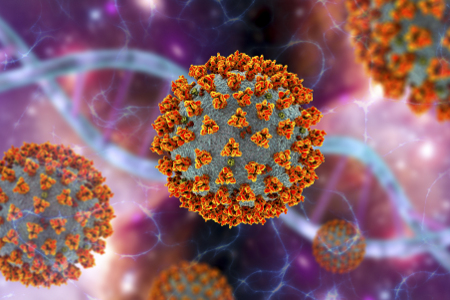Summary
Definition
History and exam
Key diagnostic factors
- previous diagnosis of COVID-19 or history of suspected acute COVID-19 illness
Other diagnostic factors
- fatigue/weakness
- cognitive impairment (brain fog)
- impaired sleep
- headache
- dizziness
- dyspnea
- cough
- anosmia/dysgeusia
- pain (including arthralgias and myalgias)
- chest pain
- postexertional malaise
- anxiety/depression
- palpitations
- thirst/dry mouth
- loss of sexual drive or capacity
- numbness/tingling
- hair loss
- gastrointestinal symptoms
Risk factors
- severe COVID-19 illness (requiring hospitalization or ICU admission)
- not vaccinated or only partially vaccinated against COVID-19
- female sex
- age >40 years
- BMI >30 kg/m²
- smoking
- anxiety/depression
- asthma
- chronic kidney disease
- chronic obstructive pulmonary disease (COPD)
- diabetes
- immunosuppression
- ischemic heart disease
Diagnostic investigations
1st investigations to order
- clinical diagnosis
- complete blood count
- comprehensive metabolic panel
- creatine kinase
- C-reactive protein
- erythrocyte sedimentation rate
- serum ferritin level
- thyroid function tests
- serum 25-hydroxy vitamin D
- pulse oximetry
Investigations to consider
- orthostatic testing-tilt table testing
- electrocardiogram
- pulmonary function testing
- chest radiograph
- chest CT
- B-type natriuretic peptide
- D-dimer
- antinuclear antibody
- rheumatoid factor
- anti-cyclic citrullinated peptide
- serum vitamin B12
- blood thiamine
- serum folate
- plasma homocysteine
- high sensitivity troponin
- transthoracic echocardiogram
- ambulatory cardiac monitoring
- cardiac stress test
- cardiopulmonary exercise test
- cardiac MRI
- autonomic function testing
- overnight sleep study
- MRI head
- neuropsychological testing
Treatment algorithm
all patients
Contributors
Authors
Benjamin Abramoff, MD, MS
Assistant Professor of Physical Medicine and Rehabilitation
Perelman School of Medicine
University of Pennsylvania
Philadelphia
PA
Disclosures
BA has served on medical advisory boards regarding long COVID for Pfizer, Axcella Pharmaceutical, AstraZeneca, Intrivo Diagnostics, and UnitedHealthcare.
Shawn Joshi, MD, PhD
Clinical Resident of Physical Medicine & Rehabilitation
Spaulding Rehabilitation Hospital
Clinical Fellow in Medicine
Harvard Medical School
Boston
MA
Disclosures
SJ declares that he has no competing interests.
Eric Herman, MD
Assistant Professor of Family Medicine
School of Medicine
Oregon Health and Science University
Portland
OR
Disclosures
EH speaks on evaluation and management of Long COVID nationally. EH is developing educational material for the AAFP. EH has published other manuscripts as part of his current academic role with other leading medical publications.
Acknowledgements
Dr Benjamin Abramoff, Dr Shawn Joshi, and Dr Eric Herman would like to gratefully acknowledge Dr Julie Silver, a previous contributor to this topic.
Disclosures
JS has participated in research funded by NIH and foundations on topics not related to COVID-19 including culinary medicine, prehabilitation, and chronic pain. JS is author of references cited in this topic.
Peer reviewers
Sarah Jolley, MD, MSc
Associate Professor
Division of Pulmonary Sciences and Critical Care Medicine
University of Colorado
Denver
CO
Disclosures
SJ receives NIH funding for work related to long COVID via the RECOVER consortium and AHRQ related to long COVID care delivery.
Trisha Greenhalgh, MA, MD, FRCP, FRCGP, FFPH, PhD
Professor of Primary Care Health Sciences
University of Oxford
Oxford
UK
Disclosures
TG is an author of references cited in this topic.
Peer reviewer acknowledgements
BMJ Best Practice topics are updated on a rolling basis in line with developments in evidence and guidance. The peer reviewers listed here have reviewed the content at least once during the history of the topic.
Disclosures
Peer reviewer affiliations and disclosures pertain to the time of the review.
References
Key articles
National Institute for Health and Care Excellence. COVID-19 rapid guideline: managing the long-term effects of COVID-19. January 2024 [internet publication].Full text
Centers for Disease Control and Prevention. COVID-19: clinical overview of long COVID. Feb 2025 [internet publication].Full text
Yelin D, Moschopoulos CD, Margalit I, et al. ESCMID rapid guidelines for assessment and management of long COVID. Clin Microbiol Infect. 2022 Jul;28(7):955-72.Full text Abstract
US Department of Veterans Affairs. Whole health system approach to long COVID: specialty care (nervous system). Sep 2024 [internet publication].Full text
US Department of Veterans Affairs. Whole health system approach to long COVID. August 2022 [internet publication].Full text
Reference articles
A full list of sources referenced in this topic is available to users with access to all of BMJ Best Practice.

Differentials
- Myalgic encephalomyelitis/chronic fatigue syndrome (ME/CFS)
- Post-intensive care syndrome
- Postural orthostatic tachycardia syndrome (POTS)
More DifferentialsGuidelines
- Clinical overview of long COVID
- COVID-19 rapid guideline: managing the long-term effects of COVID-19
More GuidelinesPatient information
Anxiety: what are the treatment options?
COVID-19 (coronavirus)
More Patient informationLog in or subscribe to access all of BMJ Best Practice
Use of this content is subject to our disclaimer